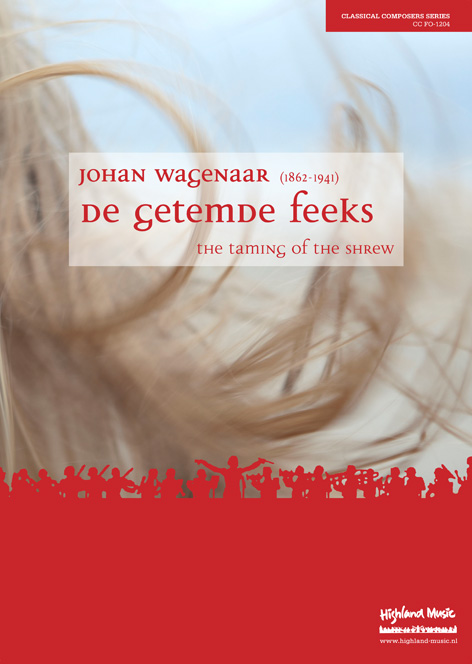De getemde Feeks (The Taming of the Shrew)
Buy this item (in stock)
Product ID: HM1 CS FO-1203
By Johan Wagenaar
Publisher:
Highland Music
Arranger:
orig.
Series:
Composers Series
Genre:
Romantic
Line Up:
Symphony Orchestra
Duration:
7:30
Level: 5+
Set & Score
This item is in stock
About this item
Johan Wagenaar was a Dutch composer fromUtrecht. From the age of thirteen he received piano and violin lessons. Organ, theory and composition lessons he later took from Richard Hol. Besides his career as a composer, he was first director of the Utrecht school of music, from 1919 to 1937 he was director of the Royal Conservatory in The Hague. Known as choirmaster he brought many Dutch and international premieres. As a teacher he was very popular, his most famous pupil was undoubtedly Willem Pijper. He died on 17 June 1942.
Following Richard Strauss wrote Wagenaar especially symphonic poems as Saul and David (inspired by Rembrandt’s painting), Cyrano de Bergerac (by Edmond Rostand) and The Taming of the Shrew (by William Shakespeare).
Instrumentation
2 Flutes (2nd doubling Piccolo)
2 Oboes
2 Clarinets in A
2 Bassoons
4 Hoorns in F
2 Trumpets in C
3 Trombones
Tuba
Timpani
Percussion**
Harp
Strings
Reviews and rating
No review available, be the first to write one!

Composer
Johan Wagenaar 1862 – 1941)
Born in Utrecht, out of wedlock, he was the son of Cypriaan Gerard Berger van Hengst and Johanna Wagenaar. Wagenaar's parents were of different social strata: his father was an aristocrat, while his mother was of more humble origins. For this reason, Wagenaar's parents were not married, and thus Wagenaar received his mother's name as his family name.
Wagenaar evidenced a talent for music as a child. However, he did not begin to receive a formal education in music until age 13, with subsequent instruction in piano, organ, violin, theory, and composition. He was under the tutelage of the composer Richard Hol and the organist Samuel de Lange, Jr. In 1892, he studied with Brahms' friend Heinrich von Herzogenberg in Berlin, specifically taking lessons in counterpoint.
In 1888, he succeeded Richard Hol as organist of Utrecht Cathedral, and earned fame for his skills at organ performances. In Utrecht, Wagenaar became a teacher at the music school in 1896, and the school's director in 1904. He also received an appointment with the Utrecht Municipal Orchestra (Utrechtsch Stedelijk Orkest). Between 1919 and 1937, Wagenaar was director of the Royal Conservatory at the Hague. His pupils included Peter van Anrooy, Emile Enthoven, Henri van Goudoever, Alexander Voormolen, Leon Orthel, Allard de Ridder, Willem Pijper and Bernard Wagenaar.
He died in Den Haag.
Wagenaar's compositions include operas, cantatas, organ music, and orchestral works.[5] The music of Hector Berlioz had a modest influence on his works, but a much more pronounced influence was Richard Strauss.
In his later years, Wagenaar received an honorary Doctorate of Music from Utrecht University.
More info about the composer...



 Click above to view samples
Click above to view samples
